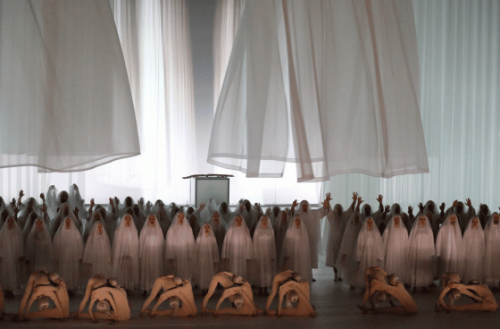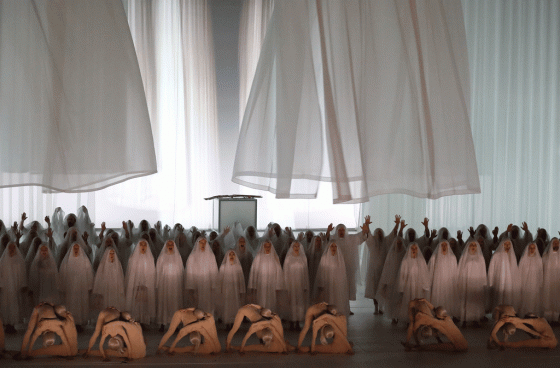 Germany Wagner, Tannhäuser: Soloists, Chorus of the Bayerische Staatsoper, Bayerisches Staatsorchester / Simone Young (conductor), Nationaltheater, Munich, 5.5.2019. (JMI)
Germany Wagner, Tannhäuser: Soloists, Chorus of the Bayerische Staatsoper, Bayerisches Staatsorchester / Simone Young (conductor), Nationaltheater, Munich, 5.5.2019. (JMI)

Production:
Director – Romeo Castellucci
Sets, Costumes and Lighting – Romeo Castellucci
Choreography – Cindy Van Acker
Cast:
Tannhäuser – Klaus Florian Vogt
Elisabeth – Lise Davidsen
Wolfram – Ludovic Tézier
Venus – Elena Pankratova
Landgraf – Stephen Milling
Walther – Dean Power
Biterolf – Peter Lobert
Heinrich – Ulrich Ress
Reinmar – Lukasz Konieczny
Shepherd – Anna El-Khashem
This Romeo Castellucci production premiered here at the July 2017 Festival, replacing the previous staging by David Alden. I had the opportunity to attend the Alden in 2006 under the baton of Zubin Mehta, then musical director in Munich, and featuring two wonderful singers in the roles of Elisabeth and Venus: Anja Harteros (who sang the part again at the premiere of this new production) and the great Waltraud Meier.
Let me start by saying that I am not fond of Castellucci’s staging. I cannot say that I was disappointed because that would require having high expectations beforehand. His work may be full of ideas, but they are of little interest and, above all, are not suited to narrate this opera’s plot. It is one more case of a production that is not at the service of the opera, as it should always be.
The (practically non-existent) sets, costumes and lighting are all by the director. The stage is basically bare in Act I; a mobile element is added where Venus is lying with some rather strange companions. The singing contest takes place on a stage with white curtains, white robes for the singers and guests dressed in white tunics. Act III is set in a kind of tomb or pantheon where Elisabeth prays, accompanied by Wolfram; where Tannhäuser arrives to tell his story of Rome; and where the opera ends.
One really needs a manual that explains the director’s concepts. With the Overture we are in Venusberg, where a large group of Amazons carrying archery equipment are practicing their shooting – but why? For the singing contest, Castellucci has the singers, the Landgraf and the chorus lying on the floor while a group of naked-seeming extras move about the stage. The worst is the third act: during the story of Rome there is a continuous stream of extras who carry corpses in different stages of decomposition which are deposited in the tombs. The continuous movement only serves to distract attention from the singing. Elisabeth dies and lies down in a tomb, but then sits up for the remainder of the opera without saying or doing anything. Direction in the crowd scenes is practically nonexistent: it seems more like an opera in concert, as if Castellucci were only interested in the choreographic groups.
Simone Young’s conducting was good overall, and it got progressively better as the opera went on. Altogether it was a convincing reading, and I would single out the magnificent performances of the orchestra and chorus.
As in the premiere of this production, Tannhäuser was again played by Klaus Florian Vogt, whose performance was impressive: he sings in an outstanding way and his voice reaches the audience perfectly. His vocal suitability to this role is something else. His Lohengrin and Walther are outstanding, but as Tannhäuser I miss a more dramatic or, if you prefer, less angelic voice than his.
Elisabeth was played by the young soprano Lise Davidsen, whose performance was great from beginning to end. She is one of the most interesting sopranos today, with a beautiful voice of considerable volume. I had the chance to see her two years ago in Wexford as Cherubini’s Medea, and was impressed by her then. She has an important future in opera.
Ludovic Tézier as Wolfram was excellent, with a superb voice and sense of singing, especially in the more than famous ‘Song of the Star’. He is in a terrific moment.
Good too was soprano Elena Pankratova in the part of Venus, with her powerful, well-handled voice, although I did miss more sonority in her lower notes. Stephen Milling and his attractive voice did well as the Landgraf.
In the secondary characters Dean Power (Walther), Peter Lobert (Biterolf), Ulrich Ress (Heinrich) and Lukasz Konieczny (Reinmar) all handled their roles correctly. Finally, the Shepherd was sung by soprano Anna El-Khashem, who did well.
José M. Irurzun
